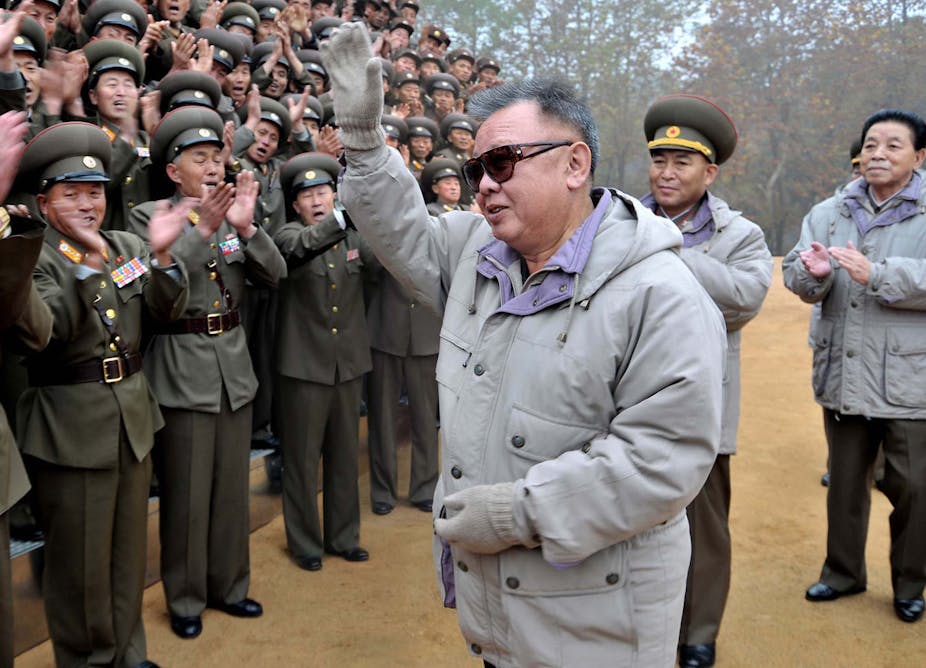North Korean dictator Kim Jong-il has died at the official age of 69 (it is believed he was 70). The nation’s “dear leader” was reported by state television to have died on a train trip yesterday morning. He ruled North Korea for 17 years, inheriting the communist regime founded by his father, Kim Il-sung.
He leaves his youngest son, Kim Jong-un, as North Korea’s leader.
The Conversation spoke to Asian Studies expert Professor Bruce Jacobs about the significance of his death.
What’s the significance of Kim Jong-il’s death?
North Korea is one of the few countries that still have dynasties where you pass from father to son, and the only rulers of North Korea have been Kim Jong-il’s father and now himself. So there hasn’t been lots of leadership change and there isn’t a great deal of diversity. It’s been a very central, top-down system. It’s a bit hard to know what’s going to happen. He tried to set up one of his sons to be his successor but whether that will be successful or not I think time will show.
What are the wider implications for the region?
Well, North Korea has been a very destabilising influence. On one hand it promises it won’t set up nuclear weapons and then it makes nuclear developments and explodes weapons. At the same time its people are starving, its agricultural system clearly isn’t working and it isn’t just the weather, it’s fundamental problems with the system. It’s very unclear what will happen. North Korea has a huge military, something like over 20% of the population is involved with the military and the amount of resources it uses is very great. There’s a potential destabilisation and there are potential threats. Not only to South Korea but to other countries. The Chinese are very concerned there’ll be a huge flow of refugees north across their common border. There’s a whole host of potential things that could happen but we don’t know for sure until they happen.
Do you think the West might see this as an opportunity for change in North Korea?
People would like to see a new system in place that is seen as more responsive to the people, whether that will happen again is unclear. Part of the problem is that the secondary leadership under Kim Jong-il is not well known and very few people know very much about it all. The military as a group will clearly be important but there’ll be other people too who’ll have input, and most of these people who have risen to the top in the system don’t particularly have open minds. Again, it’s been despairing for the Chinese who’ve shown Kim Jong-il and other leaders what you can do with economic reform, but the North Koreans just haven’t been interested.
How much do we know about his successor, Kim Jong-Un?
We don’t know very much at all. He went to school in Switzerland but apart from that we don’t know very much about him at all.
So we really have no idea what kind of leader he’s going to be?
No. He’s very young, he’s in the system but he’s only in his twenties I believe. He doesn’t have a lot of experience. We don’t know if he’ll be a puppet of other people. We just don’t know. The other possibility is if the whole system collapses the Koreans could reunify under the leadership of the South Koreans. That would have a lot of potential benefits for the Koreans living north of the border, but it would also be extraordinarily expensive. If you look at communist countries before the fall of communism in 1990, the East Germans were by far the wealthiest, and yet West Germany, which was not a poor country at all, has spent a fortune trying to integrate East and West Germany. The problems with North and South Korea will be many, many times worse.
How do you think the news will be received within North Korea?
Clearly everybody will be “sad”. The official line will be “Everyone is sad that Kim Jong-il has died.” Beyond that, I think that’s when we’ll start to get hints as to what’s going on, who the real people in charge are, and their attitudes.

